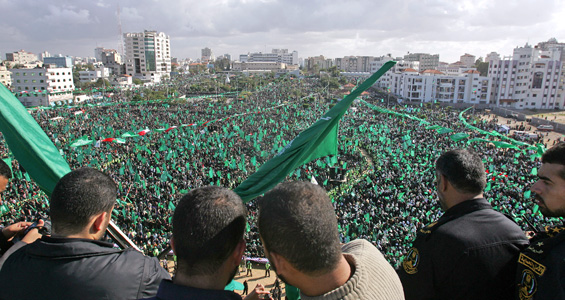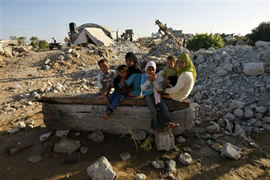Two years after Hamas seized Gaza
Gazans remain trapped by political paralysis and international intransigence.

 |
| On June 14, 2007, Hamas drove Fatah out and gained complete control over Gaza [GALLO/GETTY] |
Two years to the day after Hamas took control of the Gaza Strip, the lives of Palestinians in Gaza have seemingly become inextricably defined by two crises.
An internal political impasse has fragmented Palestinian society, reduced the credibility of Palestinian political leaders in the eyes of the public and derailed their people’s momentum for national liberation.
Meanwhile, an Israeli-imposed, western-backed siege has created a humanitarian crisis for the 1.5 million people trapped inside Gaza.
What happened on June 14, 2007 depends on whom you ask. Even the language used among Palestinians to describe the events of that day reflects their deep ideological divisions.
A difference of perspective
In the eyes of Hamas and its followers, it is known in Arabic as “el hasm” – or “decisive affirmation”.
For them, Hamas decided to end Gaza’s lawlessness, crime and corruption and US-engineered attempts by the subversive Fatah movement to undermine Hamas’s legitimate right to govern after winning the 2006 elections.
The failure of various power-sharing agreements between Fatah and Hamas, national unity governments and attempts to reform the fragmented security services into one cohesive apparatus between the elections in 2006 until June 2007 set the stage for confrontation.
| In video | ||
|
Those who do not share Hamas’s narrative of events call June 14, 2007 the “enqelaab” – the “coup”.
They say that Hamas violently ousted the legitimate Palestinian Authority, overrunning all government institutions with its loyalists.
But the critics say the movement and its paramilitary forces were not prepared to govern, nor were they accustomed to the dissent found in the plurality of a democratic society.
Hamas, they say, wanted to dominate Palestinian politics by ballots and by guns – thus jeopardising years of struggle for statehood lead by the Fatah-dominated Palestinian Liberation Organisation (PLO).
Regardless of the classification, those fateful days when Hamas gained and solidified its complete control of Gaza have been a defining moment for the Palestinian people and for the region.
Kareem Lebhour, a reporter for Radio France International, was one of the few international journalists who was in Gaza during the takeover.
He believes that the events of June 14 have been exploited by Arab regimes, the US and Israel for their own political agendas.
“Nobody wanted to see Hamas succeed in governing [after the elections they won in 2006],” he said.
Fearful of losing power to Islamist movements, governments across the region have been very cautious in allowing fair, democratic elections.
Instead, they have pointed to the Hamas takeover as a warning, as fitting the image of “Muslim men in beards with guns” taking over power, Kareem said.
In a near complete reversal from its earlier objective of promoting democracy through the Arab world, the administration of George Bush, the former US president, eased off calls for more democratic reforms across the region, fearing Hamas’s popular win could repeat itself in strategic American allies such as Egypt, Jordan and the Gulf States.
Instead, the international community turned its back on the legitimate winners of the Palestinian elections, setting the tone for internal political divisions and bloody clashes between the Hamas movement and its political rivals in the US-backed secular Fatah organisation.
Ignoring Gaza’s reality
If there is one conclusion that all regional players and the US have reached over the past two years, it is that ignoring Gaza’s reality is done at their own peril.
 |
| More than 80 per cent of Gaza’s population rely on some sort of assistance [AFP] |
If Fatah and the PLO want to carry out elections across the Palestinian territories, they must incorporate Hamas.
If Hamas wants to extend its influence across the geographic divide into the West Bank and cast off its international pariah status, it must tolerate political, social and cultural plurality and demonstrate pragmatism in its dealings with those it ideologically opposes.
If the US is serious about achieving a lasting and just peace in the region, it must acknowledge Hamas and what it stands for among the Palestinian people.
And if Israel is to achieve any semblance of security, it will have to deal with Hamas either directly or indirectly.
Life in Gaza
The past two years have been lost time.
Many believe the greatest casualty has been the deliberate social, economic and humanitarian degradation of 1.5 million people forced into abject destitution.
Since 2007, Gaza has passed through isolation, economic sanctions, a brutal Israeli assault – both physical and psychological – and a stifling siege that has made life intolerable.
| In depth |
|
|
It has been allowed to happen because of the complicity of the US, European countries, and Arab governments.
Every measure of life in Gaza has grown increasingly worse – from education to health care to economics.
What was once classified as a modest economy has now been reduced to an aid-dependent society with more than 80 per cent of the population relying on some sort of assistance.
Today, the most thriving industry is smuggling, through the tunnels along the border between Egypt and Gaza.
Nearly 1,000 tunnels have been dug to smuggle everything and anything needed in Gaza.
From basic food to medicine, the tunnels have become Gaza’s lifeline to the outside world and a testament to the indomitable will of the Palestinian people to survive these past two years.
There has been little apparent progress in Gaza since 2006, but some credit Hamas with re-establishing law and order.
Officials in Gaza are quick to cite the reduced crime rate and the security that has been restored by the Hamas-run government and security services.
However, human rghts organisations say it has come at a price.
Political and civil liberties in Gaza have shrunk and they accuse Hamas and its security services of often going beyond the rule of law to enforce the law.
A recent crackdown on Hamas in the West Bank by the Palestinian Authority resulted in Hamas security detaining dozens in Gaza.
It is a vicious cycle of revenge, attacks and detentions that has marked and marred the last two years of Palestinian rivalry.
‘The way ahead’
The way ahead for the Palestinians is unity.
Time and time again, from pundits to experts, from the factional leaders to ordinary Palestinians, calls for national unity have become the rallying mantra.
Every round of talks aimed at ending the two-year-old political infighting brings the people a little closer to hope that their lives may soon change.
The way ahead for Gaza will largely depend on how much more the international community – predominantly the US and its Western allies – is willing to tolerate these dire humanitarian conditions.
In his recent speech to the “Muslim World”, Barack Obama, the US president, said that the “humanitarian crisis in Gaza does not serve Israel’s security interests”, a suggestion that the status quo is untenable.
Whether the US will mount more pressure on Israel to change the reality on the ground remains to be seen and more of that will be gleamed when Binyamin Netanyahu, the Israeli prime minister, outlines his cabinet’s diplomatic agenda for peace on Sunday, the same day as the anniversary of the Hamas’s takeover of Gaza.
Until either one of these crises is resolved, Palestinians in Gaza will undoubtedly find themselves living in the balance between internal political paralysis and external international intransigence to their suffering.


